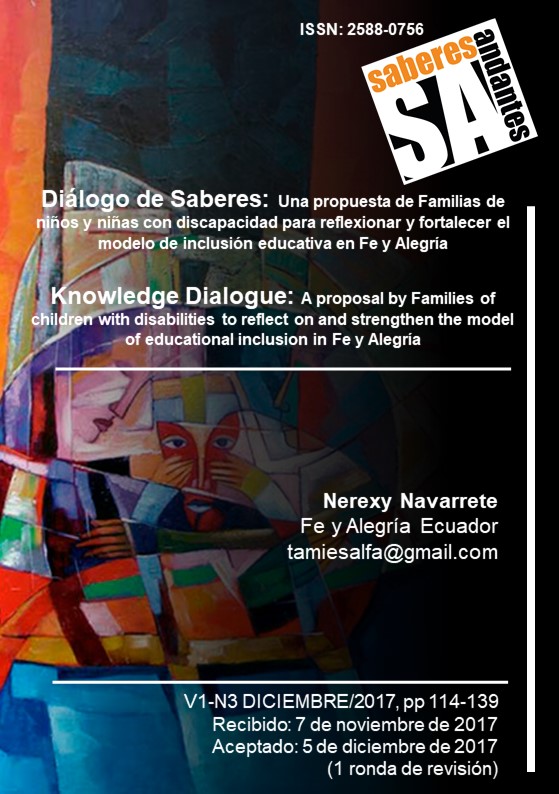Dialogue of Knowledge
A proposal of Parents of children with disabilities to reflect and strengthen the model of educational inclusion in Fe y Alegría
DOI:
https://doi.org/10.53387/sa.v1i3.24Keywords:
family, disability, dialogue, community, caring for the caregiver, educationAbstract
This brief is concerned with the key role of the family as the fundamental group in society and in education, highlighting creative, innovative and transformative dialogue as an essential element to strengthen their capacity to be Subjects of Rights in a society of exclusion. To that effect, this document begins with the review of a few studies on family, Families raising children with disabilities, the relationship: family-school and school-family and the perspective of Fe y Alegría concerning the family.
In the second part of the document, the Dialogue of Knowledge process is made known, which becomes a meeting point for families, which as the name suggests, it stems from the different knowledges to build knowledge. Such knowledge is built with the families that are part of the proposed educational inclusion of Fe y Alegría, with whom spaces such as these are created to conduct reflection u pon the social problems and exclusion they live. The situation of their son or daughter who has disability, are dealt with the lack of spaces to expand their relationships, to generate networks of support, among other conditions of exclusion. Finally, it examines certain impacts of the process and comes to conclusions about how to hold it.
Downloads
References
Díaz, J. (Mayo de 1990). Etimologías Latinas del Español. Obtenido de CDigital: http://cdigital.dgb.uanl.mx/la/1020081964/1020081964.PDF
Esclarin, A. P. (1992). Ideario de José Maria Vélaz. Caracas.
EUSKO JAURLARITZA GOBIERNO VASCO. (2007). PLAN DE FAMILIA CASTELLANO . Victoria- Gasteiz: Eusko Jaurlaritzaren Argitalpen Zerbitzu Nagusia.Centro de Publicaciones del Gobierno Vasco.
F.CUXT.LFINA. (10-20 de SEPTIEMBRE de 2017). WWW.AUTISMO.ES/AUTISMO/DOCUMENTACION/DOCUEMNTS/20 EFECTO DE UN HIJO CON AUTISMO EN LA FAMILIA.PDF.
Fe y Alegria Ecuador . (2016). Horizonte Pedagogico Pastoral . Quito: Ideaz.
Federación Internacional de Fe y Alegría. (2005b). Fe y Alegría: Actor internacional y agente de sensibilización para la transformación social. Educación Popular y Transformación Social, 9-28.
Federacion Internacional Fe y. (2013). Revista -Callidad - Relación - Escuela- Comunidad. Las relaciones entre la escuela y comunidad un medio para vivir la identidad de Fe y Alegría., 16.
Federacion Internacional Fe y Alegría . (1984 y 1985). Ideario Internaional de Fe y Alegria . Mérida (Venezuela) y San Salvador (El Salvador).
Federeacion Internacional Fe y Alegría. (2005). Palabras de Fe y Alegría. Citas Inspiradoras del Padre José María Velaz . Caracas, Venezuela: Exlibris.
Figeroa, D. t. (2017). Formación Red Convivencia Ecuador . Prácticas - Diálogo -Conversacion , (pág. 10). Quito.
Figueroa, D. D. (2017). Breve Introduccion al Construccionimos Social. Cuiado al Cuidador (pág. 15). Quito : Red Convivencia .
Kliksberg, B. (2005). La Familia en Ámerica Latina , Realidades interrogantes y Prespectivas. 38 volumen 12, 1-30.
Lowney, C. (2004). El Liderazgo al Estilo de los Jesuitas. Bogota. Colombia: Norma.
Mejia, M. R. (2015). La sistematización . Quio.
Ministerio de Trabajo y Asuntos Sociales y La Universidad de Oviedo (Cn-06-142B). (2006). número 3 Estrategias para prevenir y afrontar conflictos en relaciones familiares (padres e hijos). Oviedo: Cátalogo General de publicaciones oficiales http://www.06.es.
Naciones Unidas . (2015). http://www.un.org/es/documents/udhr/UDHR_booklet_SP_web.pdf. Obtenido de http://www.un.org/es/documents/udhr/UDHR_booklet_SP_web.pdf.
Navarrete, N. (2017). La familia. Portoviejo: XX.
Nerexy Navarrete, Tarcisio Vallejo y Carlos Vargas. (2017). El Reto de Liderar en Comunidad . Quito.
Rodríguez, R. (15 de Noviembre de 2016). Diálogo de Saberes Primer Encuentro. (L. Llumiquinga, Entrevistador)
Sarto Martín, M. P. (2001). III CONGRESO “La Atención a la Diversidad en el Sistema Educativo”. FAMILIA Y DISCAPACIDAD (págs. 1,2,3).
Salamanca: Instituto Universitario de Integración en la Comunidad.
Tapia Figeroa, D. (2017). Formación Red Convivencia Ecuador. Prácticas - Diálogo -Conversacion, (pág. 10). Quito.
Unesco. (1968). El Derecho de Ser hombre . Salamanca : Sigueme. Apdo. 332-Salamanca- España.

Downloads
Published
How to Cite
Issue
Section
License
Copyright (c) 2017 Saberes Andantes

This work is licensed under a Creative Commons Attribution-NonCommercial-ShareAlike 4.0 International License.
1. Derechos de autor
Las obras que se publican en Saberes Andantes están sujetas a los siguientes términos:
1.1. Saberes Andantes, conserva los derechos patrimoniales (copyright) de las obras publicadas, favorece y permite la reutilización de las mismas bajo la licencia Licencia Creative Commons 4.0 de Reconocimiento-NoComercial-CompartirIgual 4.0, por lo cual se pueden copiar, usar, difundir, transmitir y exponer públicamente, siempre que:
1.1.a. Se cite la autoría y fuente original de su publicación (revista, editorial, URL).
1.1.b. No se usen para fines comerciales u onerosos.
1.1.c. Se mencione la existencia y especificaciones de esta licencia de uso.








